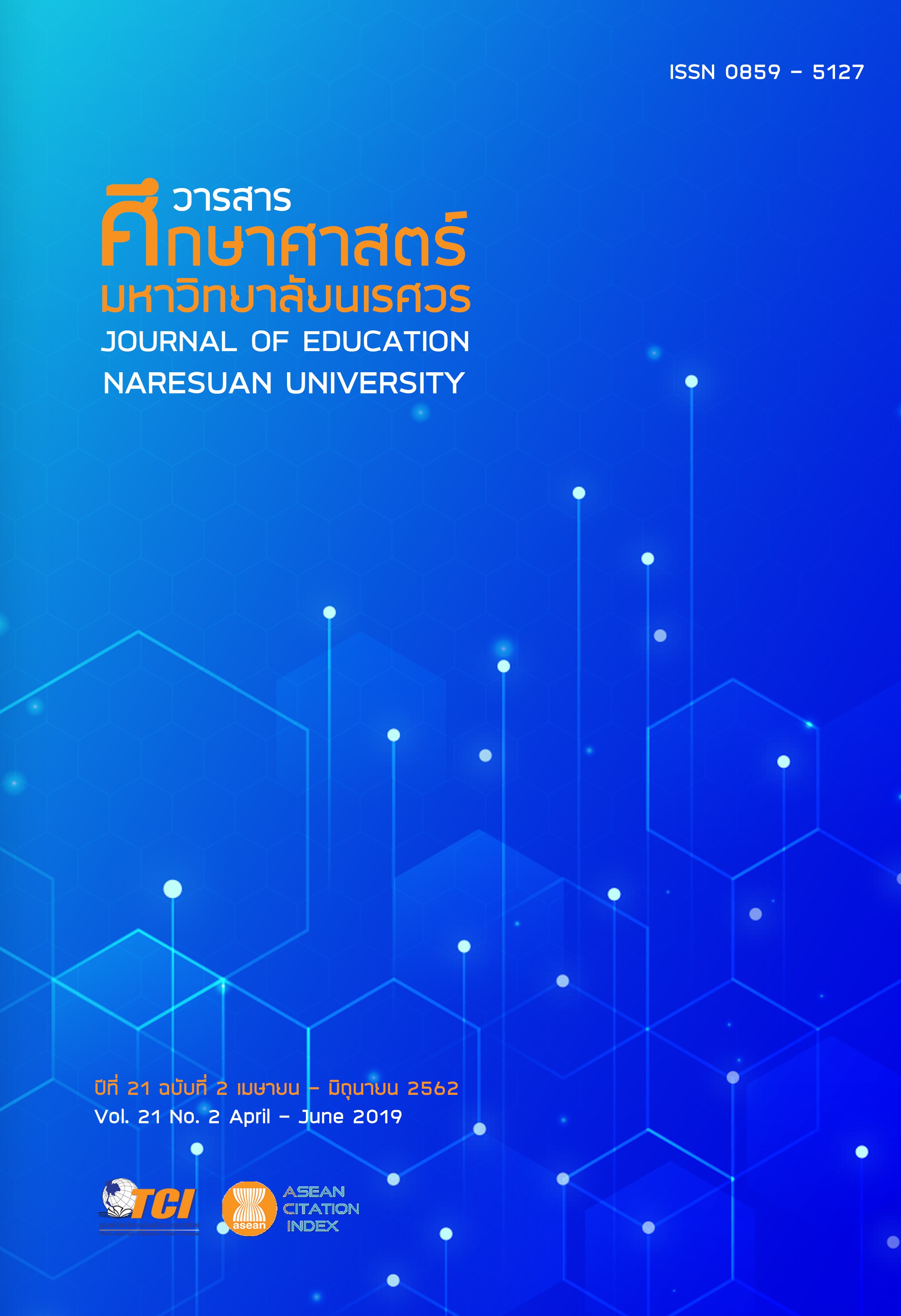แนวทางการจัดการศึกษาสันติศึกษาเพื่อลดความรุนแรงในสถานศึกษาขั้นพื้นฐาน (THE GUIDELINES FOR MANAGING PEACE EDUCATION FOR REDUCE VIOLENCE IN BASIC EDUCATION SCHOOLS)
Main Article Content
Abstract
การวิจัยนี้มีจุดประสงค์เพื่อ 1) เพื่อศึกษาสภาพความรุนแรงในสถานศึกษาขั้นพื้นฐาน 2) เพื่อนำเสนอแนวทางการจัดการศึกษาสันติศึกษาเพื่อลดความรุนแรงในสถานศึกษาขั้นพื้นฐานโดยมีวิธีการดำเนินการศึกษาค้นคว้า ดังนี้ แหล่งข้อมูลของงานวิจัย ได้แก่ โรงเรียนเครือข่ายสันติศึกษา มหาวิทยาลัยขอนแก่น และโรงเรียนนำร่องสันติศึกษาจากโครงการ สันติศึกษาในสถานศึกษาขั้นพื้นฐาน จำนวน 3 โรงเรียน คือ 1) โรงเรียนบ้านกง (ประชานุกูล) 2) โรงเรียนสันติธรรมวิทยา 3) โรงเรียนสวนสวรรค์วิทยา เครื่องมือที่ใช้ในการเก็บข้อมูลครั้งนี้ คือ การสัมภาษณ์เชิงลึก (In-depth interview) โดยผู้วิจัยได้ทำแนวคำถามจากการศึกษาเอกสาร และตำราต่างๆ สร้างแนวคำถามให้ครอบคลุมในเรื่องของความรุนแรงในสถานศึกษาและการใช้สันติศึกษาเพื่อลดความรุนแรงในสถานศึกษา หลังจากนั้นผู้วิจัยได้ทำการร่างแนวทางการจัดการศึกษาสันติศึกษาเพื่อลดความรุนแรงในสถานศึกษาขั้นพื้นฐานแล้วนำกลับไปให้ผู้ให้ข้อมูลตรวจสอบและแสดงความคิดเห็นเพื่อนำกลับมาปรับปรุงอีกครั้ง ผลการศึกษา พบว่า 1) การศึกษาสภาพปัญหาของสันตึกษาในสถานศึกษาขั้นพื้นฐานในปัจจุบันจะสามารถพบได้ว่า การจัดการศึกษาสันติศึกษาในสถานศึกษาขั้นพื้นฐานในปัจจุบันมักเป็นรูปแบบเดิมที่มีอยู่แล้วและยังไม่ชัดเจน เช่น การจัดกิจกรรทางศาสนา การปลูกฝังความสามัคคี เป็นต้น 2) แนวทางการจัดการศึกษาสันติศึกษาในสถานศึกษาขั้นพื้นฐานให้เป็นการจัดกิจกรรมสันติศึกษา และการเรียนสันติศึกษาเพื่อลดความรุนแรงในสถานศึกษาแบบบูรณาการกับรายวิชาอื่นๆ ที่มีอยู่ รวมไปถึงยังต้องเพิ่มความสามารถของครูผู้สอนให้มีความรู้ความเข้าใจเกี่ยวกับสันติศึกษาอย่างแท้จริง อีกทั้งผู้วิจัยยังยกตัวอย่างกิจกรรมสันติศึกษาและรายละเอียดของกิจกรรมเพื่อลดความรุนแรงในสถานศึกษาขั้นพื้นฐาน
THE GUIDELINES FOR MANAGING PEACE EDUCATION FOR REDUCE VIOLENCE IN BASIC EDUCATION SCHOOLS
This research aimed to study violence in basic school and how does it work or how it have been in process for many years due to now a day we also can be found violence in basic school by many ways.Two specific objects were 1) to study the violence in basic education, and 2) to provide guidelines for the management of peace education to reduce violence in basic education. This research methodology was qualitative research. The research findings were as follows: This research have 3 members school administrators which use peace education in school. The research were found as follow: 1) the study of the current situation for peace education in basic education school can be found that peace education has been used peace education’s activity as religion education, activity to cultivate unity of student and was unclear. 2) The guidelines for peace education to reduce violence in basic school have to be more activity and must integrated with other courses that available. The peace education ability for teacher is also important, the teacher must be able to adapt and lead student to make creation of peace education.
Article Details
The owner of the article does not copy or violate any of its copyright. If any copyright infringement occurs or prosecution, in any case, the Editorial Board is not involved in all the rights to the owner of the article to be performed.
References
2. Phumpakdeepan, W. (2004). The discursive practice of violence against self identity in the schooling system. Bangkok: Srinakharinwirot University. [in Thai]
3. Satha-Anand, C. (1990). Challenging options: Violence and non-violence. Bangkok: Komol Publishing. [in Thai]
4. Sittiraj, T., Pakdeewong, P., Kornpuang, A., & Chanbanchong, C. (2015). The scenarios of administration of secondary education in Thailand in the next two decades. Education Naresuan University, 17(3), 71-81. [in Thai]
5. Sinlarat, P. (1987). Peace Education: Pattern and management. In Arunee, v. (Ed.). The article from academic conference of peace education and conflict resolution. Bangkok: Faculty of Education Chulalongkorn University. [in Thai]
6. Sinlarat, P. (1990). Education for peace. Nonthaburi: Faculty of liberal arts Sukhothai Thammathirat Open University. [in Thai]
7. Sujitamrak, R. (1990). Peace studies and peace. Nonthaburi: The School of Liberal Arts Sukhothai Thammathirat Open University. [in Thai]
8. Suvannathat, C. (1973). morality development methods: The subcommittee of moral development in child training development program. Bangkok: Aksornthai. [in Thai]
9. Sukkarinkul, C., & Watcharasindhu, A. (2014). Prevalence of bullying and associated psychosocial factors among lower secondary school students in Muang, J Psychiatr Assoc Thailand Chiangmai, 59(3), 221-230. [in Thai]


